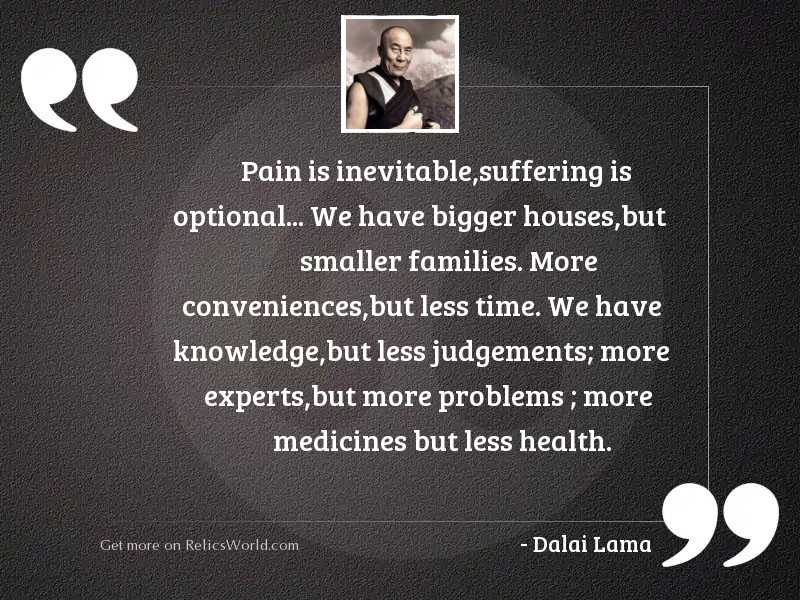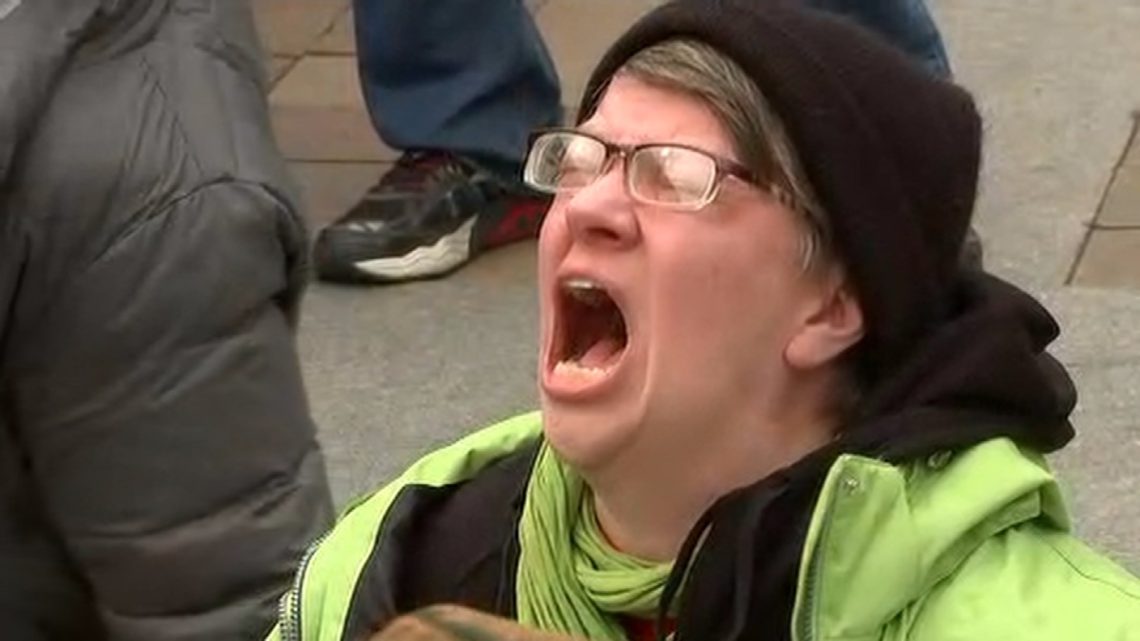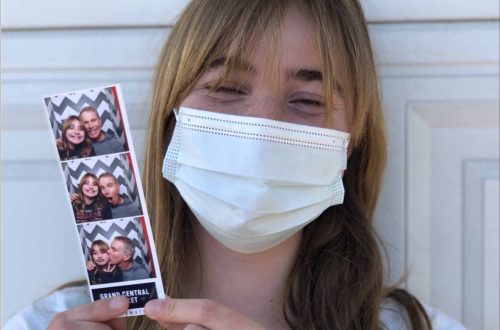I talked to a childhood friend the other day by telephone. I was surprised when he explained to me that his 21-year old son was near disconsolate over the recent fighting in Ukraine. His son was tearful much of the time and had trouble sleeping, my friend told me. The kid spent hours glued to his iPhone on YouTube and TikTok looking at reports of the Russian invasion of neighboring Ukraine —
My son is really sensitive! He would watch that video of a Russian armored personnel carrier running over that old guy in his car and could hardly speak. He would just fall apart. The emotions around this are really affecting his day-to-day life. The prospect of conflict and a possible nuclear war with Russia overwhelms him. He is really struggling.
The below is that video from the Ukraine of an elderly man in a car being run over by a Russian tank —
— that is not pleasant viewing. But I was astounded that my friend had a son whose mental health had been sent into a tailspin by watching a video.
This is a young man who dropped out of high school at the beginning of his sophomore year and never returned. He subsequently has had problems with drugs and the police. He has struggled to find direction in his life. He worked at McDonalds, and now he is at Wal-Mart; there does not appear to be anything other than disposable minimum-wage jobs ahead of him, unless he can acquire marketable skills or a solid education. He has a burning need to get his own life in order. Yet he is worrying about events 5,172 miles away from him in Ukraine? It seems a generalized anxiety gets in the way of his being able to get on the road to become a successful adult: getting an education, holding a job, building relationships, one day maybe having a family of his own.
The idea of this man-boy fathering children is a frightening prospect. He can’t take care of himself, not to mention a baby or anyone else. Yet people like this all the time become parents. It’s a nightmare.
I see all sorts of Americans similarly falling apart nowadays, and I am astounded. It is as if we have huge numbers of flailing, floundering wannabe adults. It is like a bunch of hyperbolic teenagers stuck in self-lacerating hysteria. The polite description for such people is “burned out” or “languishing.” I might use stronger language.
To the extent I embrace any philosophy and/or way of life, it would have to be Stoicism. The writing of Epictetus and Seneca, and the wry skepticism of Montaigne and Shakespeare, broadly speaking, are the closest I come to having a philosophical/spiritual “home.” And if there is any one tenet they all seem to hold, it is to lessen the role of the ego and to approach life with a certain Zen indifference – “Pain is inevitable. Suffering is optional.”– as the Dalai Lama put it. Or as is more commonly bantered: “Control what you can control, and let the rest go.” While there is much a person cannot control in the world, there is also so much you can control. Put your energies there. You would think this would be self-evident.
But such thinking seems almost countercultural in America nowadays.
The war in Ukraine. Racism, racism, racism – everywhere! Affordable housing. The homeless. Climate change. Democracy in crisis. Drug abuse and social media. Trump, Trump, Trump! Viruses and rumors of more viruses. Anxiety and depression.
WAHHHHHHH!!!!
They flail around in frenetic anxiety and then curl up in a ball of exhausted sadness. They are overwhelmed. If there is anything they are not, it is calm and self-possessed. There is little resilience, and anything remotely adverse might turn into a crisis. Even a glancing blow across the hull might send the ship of self to the bottom of the sea. Anxiety and depression medication rates in America are sky high, especially for women.
And we might expect something like this from the more edgy teenagers at any particular time. But from grown adults in their 30s, 40s, and 50s?
I have seen numerous teachers – my own profession – who say they have so much anxiety they can barely get up in the morning to go teach their classes. They are usually the younger teachers. Here is the thinking of some such:
I can hardly sleep on Sunday evenings and I hate driving into work Monday morning. The students are feral and the parents unsupportive. The education system is absolutely going down the drain and teachers get blamed for everything. Many of my students refuse to wear masks and I can hardly pay my rent on my meager salary. I am so underpaid and unappreciated. Will this ever improve? I suffer brain fog from all the stress and have suicidal thoughts.
I am going to do the absolute minimum in my job by contract. I am just hanging in there. Barely. I can’t wait to quit. I need another career. Employment where I am appreciated and paid better.
This is so hard!
Really? In my 28th year of teaching, the job has always been hard. I am always exhausted by this time of the school year. But I make it across the finish line in June, recharge my batteries over the summer, and am ready to go again in late August. That is the job. Suck it up, buttercup! What you are doing if far from impossible.
Or as the pandemic eases and mask mandates expire, I have seen many complain that they are overwhelmed by the idea of going out in public again unmasked:
I’ve been double vaccinated and I still wear my mask in all public spaces, even outside. I went to the grocery store yesterday and I was the only person wearing a mask. Life was so much easier before the mask mandates ended. I swear it’s made life so easier for me. I don’t need to fake laugh. I just can smile instead. My facial expressions aren’t as noticeable. I’ll miss wearing a mask. I might just wear one forever.
Life was not so stressful during quarantine. It is so much easier to stay home and never go outside.
It is all so hard!
Oh, you big fucking baby.
All this angst and fear? Maybe it is the ubiquity of communications technology — everyone’s nose in their smartphone has resulted in a populace that is never free from all the gloom-and-doom the news media has to peddle. The contemporary American seems to be never “unplugged.” The hive-mind on social media never rests or sleeps, but rest and sleep are important. Or maybe it is the coronavirus pandemic, income inequality, drug overdoses, gun crime, climate change, racism panic, combat in Ukraine — or a thousand other problems.
But you want to look problems in your own life or around the world squarely in the eyes, and give them fair quarter. Beyond that you want to get on with your own life. This would seem like one of the first lessons of Adulting 101.
Most of the people I know personally do exactly this and are functional adults. But I am surprised at the amount who don’t and should know better.
On the one hand, there is President Volodymyr Zelenskyy and others in Ukraine confronting a Russian invasion of their country — and all the Ukrainians overseas flying back home to fight where they are likely to encounter extreme hardship and maybe a violent death. Average everyday citizens are lining up to get government-issued AK-47 rifles to fight against the Russian invaders. They are doing it voluntarily with their eyes-wide open. I thought about joining the Ukrainians myself. This is a mindset, as well as an attitude.
On the other hand, you have too many Americans thousands of miles away who are rendered prostrate and nearly helpless in their own lives, by what is happening six thousand of miles away in Ukraine. Pathetic. Or they are highly-agitated because they encountered a perceived “microaggression” at work or at school. Or they face the prospect of going out in the streets where some people are not wearing masks and it triggers serious social anxiety. Or they are worried about their public image and getting “canceled” on social media. Or whatever. This is also a mindset, as well as an attitude.
America — a nation of wah-babies, all too often.
Ukraine — something different, as evidenced recently.
Beware, everyone. Five years will go by in a flash.
Get on with your life.
Or not.
The choice is yours.







2 Comments
Rachel
You see these struggling Americans and you feel scorn. Why not empathy?
rjgeib
I have both empathy and scorn. But the older the person gets the more I feel the latter, the less the former; they should know better. With age should come some semblance of wisdom. And patience. And perseverance. And don’t forget temperamental stability: the ability to regulate one’s emotions.